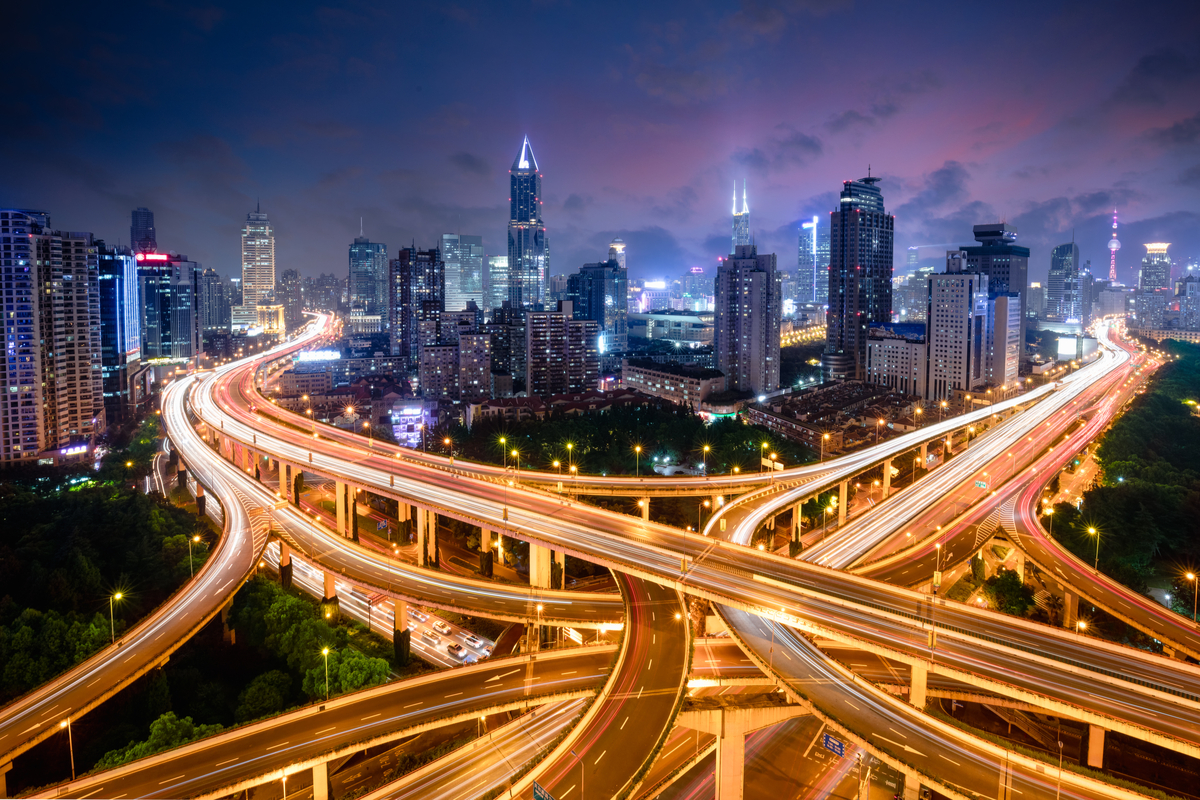China Is Not the Enemy
To land by plane in China is to be reminded how lucky one is to be an American. This assertion is in no way meant to insult the amazing country that is China. Please read on.
While those who should know better claim the once-desperately-poor country is an enemy, to walk off an airplane in Beijing, Shenzhen and Shanghai (the cities visited during this trip) is to see how very much the United States is viewed as a friend. To say the Chinese people love the American people and all that they stand for is arguably an understatement.
So the “lucky” when it comes to an American landing in China is that it’s so familiar in so many ways. To exit the plane is to be greeted by Starbucks, along with McDonald’s, Burger King’s, KFC, Pizza Hut, and seemingly every other major American fast food concept. Every menu at each has an English translation.
Call it a cliché, call it trite, but to leave the U.S. is to never really leave it. Even the street signs in China include the English spelling of each next to Chinese characters. The music in the cabs is frequently that of American artists. The comforts of home are everywhere for us, and that’s something that the citizens of realistically every other country cannot claim.
That they can’t is useful as a way of clearing up some economic misconceptions that are popular in the U.S. The first one concerns inequality. There are massive amounts of it in the U.S., and it’s beautiful. The biggest, most globally prominent corporations in the world are based in the U.S. The American creators of them are staggeringly rich because their genius touches the world. We Americans benefit from this genius in countless ways, and one obvious way is that we once again never really leave the U.S. behind. Its comforts can be found wherever people are actively tasting the fruits of capitalism.
The Myth of Communism
Which brings us to the first of many myths about China. Paranoid individuals who should know better claim it is “communist.” When they say this they’re loudly advertising their ignorance. Communism is about a near-total lack of economic freedom and private property, along with a level of poverty that the poorest of Americans would haughtily turn their noses up to. Communism, to quote Cato Institute co-founder Ed Crane, has a very distinct smell to it. The late travel writer Geoffrey Bocca confirmed much the same about the foul stench of communism after spending time in Moscow in the ‘70s. China smells of success, of people working feverishly to correct a brutal, communistic past.
Along those lines, the great George Gilder points out that he’s never met a communist in China despite decades of travel there. Gilder’s observation makes sense in consideration of China’s rapid rise from crushing poverty, but also in consideration of what the people formerly endured. How could one seriously be “communist” if the latter coincided with routine murder, starvation and endless want? And while problems remain in the country, and while human rights violations continue to properly and thankfully be reported, the Chinese are the opposite of communist.
They are because for them its horrors aren’t a theory, nor are they the stuff of documentaries and history books. They lived it. Now they’re rapidly emerging from it. True communism was easily the biggest human rights violation of all, so there’s a very reasonable argument that the errors of the present pale in comparison to the past they escaped. Notably, their escape from what brought new meaning to brutality has been the father of more myths.
An Export Economy?
One of the silliest is that the Chinese economy is now an “export-driven” one, and that to fix it the Chinese must shift the balance somewhat to a “consumer-driven” economy. Back to reality, to produce, to go to work, to export is to express a desire to import. Does anyone seriously think the Chinese have produced feverishly in modern times because they want to continue to live as they formerly did? It’s a ridiculous presumption, isn’t it?
Ok, but if you’re saying that the Chinese economy is “export-driven” you’re revealing your ignorance in much the same way as those who claim China is “communist” are. Consumption is always and everywhere a function of production first. Always. No economic school can get around this basic truth, and for the naïve who say that kids with allowances and the unemployed with transfer payments produce without consuming, you’re ignoring that parents and taxpayers have to produce first so that kids and the unemployed can consume.
All production is an expression of a desire to consume. The Chinese save more now because they’ve long been poor. They need to save. The latter is a blinding glimpse of the obvious. Furthermore, their savings in no way subtract from consumption. Think about it.
So while China’s increasingly prosperous existence very ably wrecks the “export-driven” line that has captivated PhDs for decades, what’s happening here yet again mocks the stateside narrative about motives. Already addressed was the childish presumption about it being a “communist” country, at which point it’s worth pointing out that the previous paragraph rejects the popular notion that the Chinese take advantage of us by selling us their wares, only to close off their markets to our production. No, that’s just not serious.
America Is Everywhere
Everywhere one looks here there are American brands to be found. Old Navy, Harley-Davidson, Sunglass Hut, Tory Burch, Kate Spade, Apple, Polo, and seemingly every prominent American brand can be seen. This matters because in case readers have forgotten, the U.S. is a capitalist country. Better yet, American businesses aren’t charities. They’re in China because there are buyers there who yearn to purchase all things American with their new-found wealth. In short, for witless Americans to cheer tariffs foisted on “China” with an eye on weakening the “enemy” is for those same witless Americans to cheer the weakening of the U.S. economy. The only closed economy is the world economy, and if we make neutering China our goal, many of the victims will have American addresses. Again, U.S. businesses are everywhere here.
Which raises an obvious question about China as the enemy. Really? Have you the reader heard of too many countries full of people who hate the United States but who also excitedly buy everything American? If the Chinese “hate America,” then they have a funny way of showing it. And it’s not just because American brands and stores are all over the place. It’s also on the TV one watches here.
While in this “enemy” country I watched the NBA finals, parts of the NHL finals, plus Up In the Air on HBO. The Chinese also love HBO’s Game of Thrones, which means they like American productions more than do at least some of us Americans who’ve never even watched a scene of this global television phenomenon. Movies? Other than the U.S., the biggest box office receipts for American films come from China.
Enemy country? Let’s be serious. So while Americans who should know better focus on all the Chinese goods exported to the U.S. as evidence of them taking advantage of us, a visit to China is a reminder of what should be obvious: they sell to us because they want to buy from us. And buy they do.
Thinking about imports from China more broadly, let’s never forget that we, like everyone else, produce so that we can get things. The imports improve us. That we can import from China means that we have time to focus more on the work that we do best, and that showcases our skills the most. Looked at through the lens of China, if they wanted to hurt us they would do everything possible to not export to us. Think about it.
Interesting to me about the export/import question was what a scholar at a Shanghai-based think tank told us. It’s a slight paraphrase, but he repeated over and over again in a meeting that “America” has “the ultimate export symbol: the Statue of Liberty. It has so much meaning to so many here.” So true.
To visit China is to see how very much its people venerate the U.S., and all that it stands for. They want to be like us, dress like us, they’re excited as we enter their McDonald’s restaurants, their Starbucks, etc. These distant people who are so prosperous and whom the Chinese have in many ways striven to emulate as they’ve escaped poverty, are in their country.
It brings to mind how Gatsby felt when Daisy entered his house on West Egg. At last, she could see what he had become. The Chinese give off the impression of being similarly proud (with good reason!) of what they’ve achieved, and they want us to see it. It’s very uplifting.
More uplifting is that having picked themselves up from the depths of poverty (try $178 per capita income in the 1970s), they want to visit the United States. Better yet, so interested and impressed are they by all things United States, they want to educate their kids in the U.S. About the educational aspect of it, this is merely a speculation, but one gets the feeling that the Chinese view admittance for their kids to American universities as equivalent to the excitement among American parents when their kids are admitted to Harvard, Stanford, Princeton and Yale. Just as American parents wear the achievements of their kids with pride, so it seems do Chinese parents. My daughter/son “is being educated at (name your school) in the United States” must have a fabulous ring to it in China.
The Rise of Exclusion
That it does rates mention in consideration of how the Chinese are increasingly finding it difficult to attain visas necessary to visit and/or be educated in the U.S. You see, American politicians and pundits of varying stripes have taken to referring to the Chinese as spies and/or IP thieves such that their presence in the U.S. is being billed as a national security threat. It’s all so very sad.
Our treatment of the Chinese is the equivalent of a celebrity not just refusing an autograph request, but that same celebrity subsequently telling his bodyguard to forcibly remove the autograph seeker from the room.
To all this, the allegedly wise among us will say that “you just don’t understand, the Chinese are stealing our IP and business secrets. They’re not our friends.” To which I’ll respond that lifting of ideas is as old as commerce is, that it’s the norm among all innovators; whether Thomas Edison, Henry Ford, the late Steve Jobs, Bill Gates, and every dynamic industry that’s ever prospered.
Show me a booming industry, and I’ll show you endless imitation. Crucial here is that as any entrepreneur will make plain, most ideas fail, thus rendering what’s stolen worthless. But more important for this discussion is the basic truth that genius can rarely be stolen. While Americans shamefully excuse the isolation of Huawei as a wise action rooted in “national security” and an aversion to thievery, missed is that Huawei has 80,000 R&D employees plus it spent $15 billion on R&D in 2018 alone.
Anyone who thinks innovation can be had through espionage has plainly never run a business, and likely has never worked at one. It’s so difficult to be great, and that’s why they’re generally aren’t thieves on country rich lists in countries known for innovation. Genius once again can’t be taken. Not only do most ideas not work in the first place (see the billions spent on failures by Jeff Bezos), not just anyone can execute on an idea.
As Pixar founder Ed Catmull has long said, “all of our movies suck at first.” They only become great because Pixar has amazing talent. Readers might think about that ahead of their next mindless bash of Huawei. It’s not in 170+ countries around the world because of thievery, or more laughably, because it’s bathed in subsidies.
Readers should visit China if they can. With each visit, I’m more and more taken by the progress here. I say this with full realization that Beijing, Shenzen and Shanghai hardly represent the “real China.” About what’s said to be real, I’ve been to Kashgar and Urumqi during past visits, so have at least a sense that what’s “out there” is quite a bit different. Still, the progress cannot be denied. As my good friend Richard Tren (Searle Foundation) has told me, his grandparents visited Shanghai in the late 1970s when there were but 15 tall buildings, and plumbing non-existent. To this day they don’t believe him when tells them that the revolting monument to state failure that was Shanghai now lights up like a Christmas tree each night. This rich looking city with an incredible skyline was shockingly poor just 40 years ago, and was almost as depressed 30 years ago.
Rest assured that what’s happening in China today isn’t the creation of the state as anyone with a minor understanding of 20th century could easily attest. To believe otherwise is to show an ignorance about the past, and how state control invariably results in a brutal lack of progress. Communism once again smells.
China’s prosperity speaks to just how little the state controls an economy that grows and grows. That growth that makes the U.S. economy much better with each passing day. It’s not just that Huawei is an asset to the United States as George Gilder recently said, it’s that China the country is an asset to the United States. Absent stupendous growth in China, the U.S. economy today would be quite a bit smaller.
Here’s hoping we wake up to this truth as an electorate sooner rather than later. Indeed, while the Chinese treat Americans grandly all the while trying to be like Americans, they’re proud people too. With good reason. Just as proud Americans would never countenance having their achievements reduced to thievery, neither will the Chinese forever.
If we persist in reducing their brilliant progress to anything other than hard work being matched with freedom, we risk turning the biggest consumers of all things American against the United States. The economic consequences for the American people will be unfortunate.
Our politicians are failing us in their efforts to demonize and isolate China. Yet again. Please wake up to this truth, or at least stop to consider it.
A version of this piece ran at RealClearMarkets.












